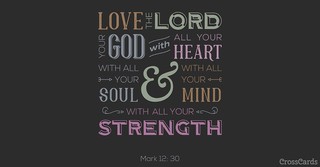
- Recent Translations
- All Translations
Mark 12:29
Share
Settings
Mark 12:29 Meaning and Commentary
Jesus answered him, the first of all the commandments is,
&c.] Christ replied at once, without taking any time to consider of it, that the chief and principal of all the commands of the law, and what is of the greatest importance is,
hear, O Israel, the Lord our God is one Lord.
The Vulgate Latin, and Arabic versions read, "one God"; but the Syriac, and Ethiopic render it, "one Lord"; and that rightly, agreeably to the Greek text, and to ( Deuteronomy 6:4 ) , from whence this is taken. This passage of Scripture, to the end of the ninth verse, is the first of the sections which were put into their phylacteries; (See Gill on Matthew 23:5); and was repeated twice every day, morning and evening; which is by the Jews called from the first word (emv tayrq) , "the reading of the Shema": concerning the exact time of the reciting of this, morning and evening, and of the posture in which they do it, reclining in the evening, and standing in the morning, and of the prayers before and after it, various rules are given in their Misna F16, or oral law; it is a precept of great esteem and veneration with them, and attended to with much solemnity. The account Maimonides F17 gives of it is this:
``twice every day they read Keriath Shema; (i.e. "hear, O Israel") in the evening and in morning, as it is said, ( Deuteronomy 6:7 ) . "When thou liest down, and when thou risest up"; in the hour it is the custom of men to lie down, and this is night; and in the hour it is the custom of men to stand, and this is day: and what does he read? three sections; and they are these, "hear" ( Deuteronomy 6:4 ) , and it shall come to pass, "if ye shall hearken" ( Deuteronomy 11:13 ) , "and Moses said" ( Exodus 13:3 ) , and they read the section, "hear, O Israel", first, because there is in it the unity of God, and the love of him and his doctrine; for it is, (lwdgh rqeh) , "the great root", or "foundation", on which all hangs or depends.''And it is observable, that the last letter of the word "hear", and the last of the word "one", are both written in very large characters in the Hebrew Bible, to denote the greatness of the command, and to cause attention to it. The Jews seek for mysteries in these letters, and think the unusual size of them, points at some very great things: they observe, that the first of these letters is numerically "seventy", and directs to the seventy names of the law, and the seventy ways in which it may be interpreted, and the seventy nations of the world, from whom the Israelites are distinguished, by their belief of the one God F18; and that the latter stands for the number "four", and shows that the Lord is the one God, in heaven and in earth, in all the world, and in the four parts of it; and that both these letters put together, make a word, which signifies "a witness"; showing that this passage is a glorious testimony of the unity of God, and that the Israelites are witnesses of it, by believing and professing it; and that should they depart from the faith of it, God would be a witness against them: and now, though there is no solid foundation for such interpretations, yet this shows what an opinion they had of the greatness of this command; to which, may be added, they ask F19,
``why does, "hear, O Israel" go before that passage in ( Deuteronomy 11:13 ) . "And it shall come to pass, if ye shall hearken diligently unto my commandments" but because a man must take upon him, first the yoke of the kingdom of heaven, and after that he must take upon him the yoke of the commandments.''The sense is, that he must first make a confession of his faith in God, which is contained in ( Deuteronomy 6:4 ) and then he must obey his commands; so that they plainly considered this, as the first and greatest of all. These words are frequent in the mouths of the modern Jews, in proof of the unity of God, and against a plurality in the Deity; but the ancient ones, not only consider them as a good and sufficient proof, that there is but one God, but as expressive of a Trinity in the Godhead: with a view to this text they observe {t}, that
``Jehovah, "our God, Jehovah"; these are, (Nygrd tlt) , "three degrees" (or persons) with respect to this sublime mystery, "in the beginning, God", or "Elohim, created", &c.''And again F21,
``there is an unity which is called Jehovah the first, our God, Jehovah; behold! they are all one, and therefore called one: lo! these three names are as one; and although we call them one, and they are one; but by the revelation of the Holy Ghost it is made known, and they are by the sight of the eye to be known, that "these three are one", (see ( 1 John 5:7 ) ,) and this is the mystery of the voice that is heard; the voice is one; and there are three things, fire, and wind, and water, and they are all one, in the mystery of the voice, and they are not but one: so here, Jehovah, our God, Jehovah, these, (Nynwwg atlt) , "three modes, forms", or "things", are one.''Once more they F23 say,
``there are two, and one is joined to them, and they are three; and when they are three, they are one: these are the two names of hear, O Israel, which are Jehovah, Jehovah, and Elohenu, or our God, is joined unto them; and it is the seal of the ring of truth.''To which I shall subjoin one passage more, where R. Eliezer is asking his father R. Simeon ben Jochai, why Jehovah is sometimes called Elohim, he replies F24, among other things;
``come see, there are (Nygrdg) , "three degrees", (or persons,) and every degree is by itself; although they are all one, and bound together in one, and one is not separated from another.''To believe this, is the first and chief commandment in the law, and is the principal article of the Christian faith; namely, to believe that there is one God, and that there are three persons, Father, Son, and Spirit, in the Godhead.
F16 Berncot, c. 1. sect. 1, 2, 3, 4.
F17 Hilch. Keriat Shema, c. 1. sect. 1, 2.
F18 Baal Hatturim, in Deut. vi. 4.
F19 Misn. Berncot, c. 2. sect. 2.
F20 Zohar in Gen. fol. 1. 3.
F21 Zohar in Exod. fol. 18. 3, 4.
F23 Ib. in Num. fol. 67. 3.
F24 Zohar in Lev. fol. 27. 2.
